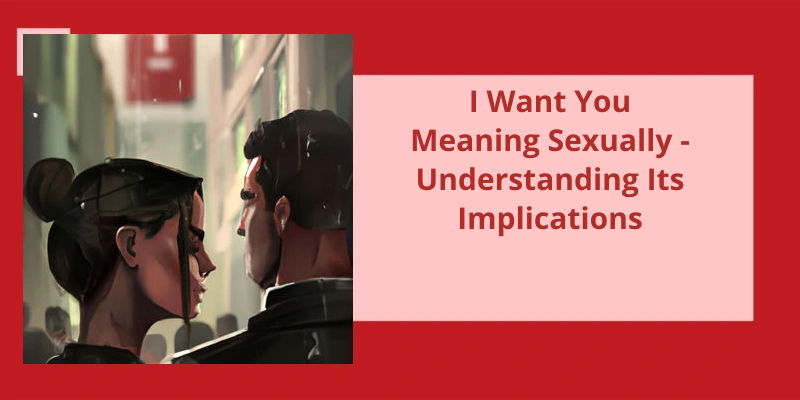The phrase "I want you" is an expression that can carry various connotations depending on the context and relationship between the parties involved. However, in most cases, it indicates a deep sexual or physical desire towards the person being addressed. The phrase tends to be more forthright and direct than "I love you," which connotes a more emotional attachment to the person in question. Therefore, it’s essential to understand the intentions and implications of the phrase before using it or responding to it.
What Is the Difference Between Need You and Want You?
There’s a distinct difference between saying “I need you” and “I want you”, and it lies in the deeper meaning and intention behind each phrase. This can be for both practical and emotional purposes. For example, a parent may say “I need you to help me fix this” to their child, or a partner may say “I need you to support me through this difficult time”.
On the other hand, saying “I want you” implies a deeper emotional desire for the person, beyond just their practical uses. It’s a way of expressing an attraction or connection to the other person, even if they may not be needed for a particular task at hand. This phrase can be used in romantic or platonic contexts, and can indicate a desire for companionship, intimacy, or genuine connection with the other person.
It’s important to note that both phrases have their place in different contexts and relationships.
However, it’s also worth acknowledging that using “I need you” too frequently can come across as demanding or codependent, while using “I want you” too much can come across as overly possessive or obsessive. As with any language, it’s important to use these phrases thoughtfully and intentionally, and to be mindful of the impact they may have on the other person.
Both are valid ways of expressing appreciation and vulnerability with others, but it’s important to use them intentionally and thoughtfully.
Examples of Situations Where One Might Use “Want” Versus “Need”
- When expressing a preference: “I want to watch a movie.”
- When expressing a requirement: “I need to eat breakfast.”
- When making a request: “I want you to help me with this.”
- When stating a goal: “I want to run a marathon.”
- When emphasizing a desire: “I really want to go on vacation.”
- When highlighting a necessity: “I need to pay my bills.”
- When expressing a wish: “I want to be a successful writer.”
- When stating a physiological requirement: “I need to sleep for at least 8 hours.”
- When expressing a craving: “I want to eat chocolate.”
Understanding the meaning behind certain phrases can often lead to confusion, especially when it comes to expressing desires and intentions in a slightly more indirect way. Recently, the phrase “I want you inside me” has caused a fair amount of confusion amongst some individuals who may not be familiar with the specific context it’s being used in. In simple terms, this phrase is a euphemism for sexual desire and can be interpreted as someone expressing a desire to engage in sexual intercourse with another person.
What Does I Want You Inside Me Mean?
When someone says “I want you inside me,” it can be interpreted as a sexual invitation or a desire to engage in sexual activity with the person being addressed. It’s a suggestive phrase that’s often used to express intimacy and desire in a romantic or sexual context.
In some cases, the phrase may be used in a more metaphoric way to express a desire for deeper emotional or spiritual connection with someone.
Whether it’s used as a playful come-on or a deeper expression of intimacy, it’s important to communicate clearly with your partner and ensure that you’re both on the same page about your desires and intentions.
The Role of Communication and Negotiation in Healthy Sexual Relationships
- Effective communication is essential for healthy sexual relationships.
- Partners should feel comfortable discussing their sexual needs and desires.
- Negotiation may be necessary to ensure both partners are satisfied with their sexual experiences.
- Consent should always be communicated clearly and respectfully.
Source: What does it mean when a guy says I like the feeling of being …
Conclusion
In conclusion, the phrase "I want you" carries a significant weight of sexual desire and attraction to a specific individual. It implies a yearning for physical intimacy rather than an emotional bond. It’s important to differentiate the meaning behind such expressions in relationships to avoid any misunderstandings and ensure the comfort and respect of both parties. Overall, communication is key to building healthy and meaningful connections with others.






